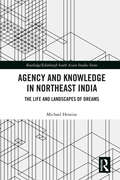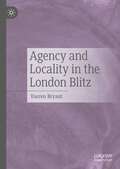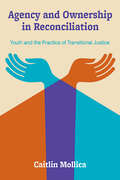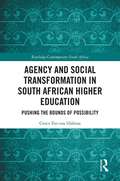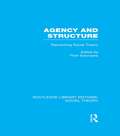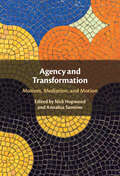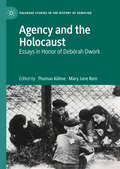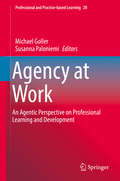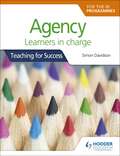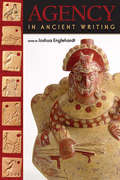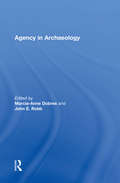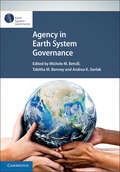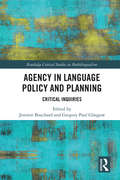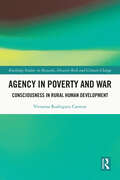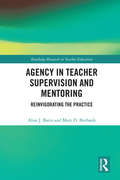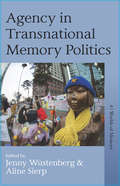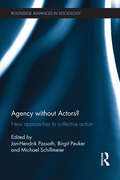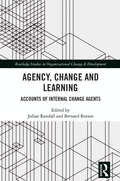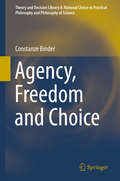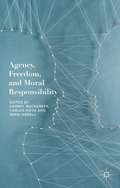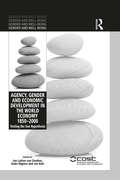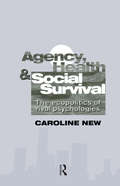- Table View
- List View
Agency and Knowledge in Northeast India: The Life and Landscapes of Dreams (Routledge/Edinburgh South Asian Studies Series)
by Michael HeneiseThe Nagas of Northeast India give great importance to dreams as sources of divine knowledge, especially knowledge about the future. Although British colonialism, Christian missions, and political conflict have resulted in sweeping cultural and political transformations in the Indo-Myanmar borderlands, dream sharing and interpretation remain important avenues for negotiating everyday uncertainty and unpredictability. This book explores the relationship between dreams and agency through ethnographic fieldwork among the Angami Nagas. It tackles questions such as: What is dreaming? What does it mean to say ‘I had a dream’? And how do night-time dreams relate to political and social actions in waking moments? Michael Heneise shows how the Angami glean knowledge from signs, gain insight from ancestors, and potentially obtain divine blessing. Advancing the notion that dreams and dreaming can be studied as indices of relational, devotional, and political subjectivities, the author demonstrates that their examination can illuminate the ways in which, as forms of authoritative knowledge, they influence daily life, and also how they figure in the negotiation of day-to-day domestic and public interactions. Moreover, dream narration itself can involve techniques of ‘interference’ in which the dreamer seeks to limit or encourage the powerful influence of social ‘others’ encountered in dreams, such as ancestors, spirits, or the divine. Based on extensive ethnographic research, this book advances research on dreams by conceptualising how the ‘social’ encompasses the broader, co-extensive set of relations and experiences - especially with spirit entities - reflected in the ethnography of dreams. It will be of interest to those studying Northeast India, indigenous religion and culture, indigenous cosmopolitics in tribal India more generally, and the anthropology of dreams and dreaming.
Agency and Locality in the London Blitz
by Darren BryantThis book takes a fresh approach to the London Blitz by viewing this time through individual local boroughs of the metropolis. The term ‘London Blitz’ means that culturally we have become accustomed to understanding that the actual blitz experience was the same wherever in the capital one happened to be, despite some areas being hit more than others. This book illustrates how there were many London blitzes, not one, influenced by a myriad of metropolitan localities, and giving rise to an agency of locality that helped to shape the lived blitz experience. By walking through the streets of London, this book conducts a local area analysis, witnessing the blitz through six London localities, representative of the assorted administrative, economic, and socio-political variables prevalent in wartime London. Covering air raids alongside topics like the provision of shelters, homelessness, and communal feeding, it shows how any history of the London Blitz must acknowledge that it was an experience reflective of a varied metropolis.
Agency and Ownership in Reconciliation: Youth and the Practice of Transitional Justice
by Caitlin MollicaThe importance of youth's substantive participation for the realization of inclusive reconciliation practices has rarely been acknowledged. Agency and Ownership in Reconciliation provides a comprehensive, nuanced, and empirical account of the contribution of young people's voices to the success of transitional justice and peacebuilding practices. Caitlin Mollica illustrates the role of political will and agency in the development of transitional justice mechanisms that are substantively inclusive of those traditionally marginalized by post-conflict institutions, most notably youth. In doing so, she highlights the importance of youth to lasting peace and meaningful justice. She does so by looking specifically at how truth and reconciliation commissions from South Africa to the Solomon Islands engage with the voices of youth and the meanings youth self-ascribe to their experiences during truth and reconciliation commission processes. In a field which traditionally prioritizes stories about youth, Agency and Ownership in Reconciliation looks to center stories by youth.
Agency and Social Transformation in South African Higher Education: Pushing the Bounds of Possibility (Routledge Contemporary South Africa)
by Grace Ese-osa IdahosaThis book explores the process of transformation, discussing how individuals are capable of acting to enable transformation of structures and cultures through the lens of South African higher education. Agency and Social Transformation in South African Higher Education examines the role of agency in effecting change amidst the rigid conditions within South African universities. Arguing for a focus on transformation from below, it explores transformation and agency from the perspective of academic staff. Through discussing moments at which faculty members embedded in rigid structures and cultures perceive themselves as having had the agency to interrupt and transform them, despite their rigidity, this book describes the nuances of social action and agency within the South African higher education institutional context and the ways in which contextual histories may provide enabling/limiting conditions to individuals within them. This book makes an important contribution to the field of agency and social transformation theoretically, methodologically and geographically as it details the motivations for transformation, how individuals become agents of change and the practical experiences of these individuals from a localised perspective. Agency and Social Transformation in South African Higher Education will be of interest to scholars and students of African higher education, transformation studies and postcolonial studies.
Agency and Structure: Reorienting Social Theory (Routledge Library Editions: Social Theory)
by Piotr SztompkaA striking feature of the human condition is its dual, contradictory, inherently split character; on the one hand, autonomy and freedom; on the other, constraint and dependence on social structure. This volume addresses this central problem of the linkage between human action and social structure in sociological and social science theory. Contributions cover several different approaches to the agency-structure problematic, and represent the work of a number of leading international sociologists. Their efforts point to a reorientation of social theory, both on philosophical and methodological levels.
Agency and the Holocaust: Essays in Honor of Debórah Dwork (Palgrave Studies in the History of Genocide)
by Thomas Kühne Mary Jane ReinThe book assembles case studies on the human dimension of the Holocaust as illuminated in the academic work of preeminent Holocaust scholar Deborah Dwork, the founding director of the Strassler Center for Holocaust and Genocide Studies, home of the first doctoral program focusing solely on the Holocaust and other genocides. Written by fourteen of her former doctoral students, its chapters explore how agency, a key category in recent Holocaust studies and the work of Dwork, works in a variety of different ‘small’ settings – such as a specific locale or region, an organization, or a group of individuals.
Agency at Work: An Agentic Perspective on Professional Learning and Development (Professional and Practice-based Learning #20)
by Michael Goller Susanna PaloniemiMichael Goller gives a structured overview of the current discourses of human agency in relation to professional learning and development. Based on this discussion, the author develops a theoretical framework including human agency as an individual feature (i. e. , a disposition) as well as a set of self-initiated and goal-directed behaviours that are assumed to affect employees' learning and development (e. g. , crafting of new work experiences). He then further specifies this theoretical framework and investigates it empirically in the domain of geriatric care nursing. Based on the findings of the three empirical studies conducted, the author discusses the relevance of human agency for the development of professional expertise of geriatric care nurses.
Agency for the IB Programmes: For PYP, MYP, DP & CP: Learners in charge (Teaching for Success)
by Simon DavidsonTeach for success and implement effective strategies to develop a learning community that supports student agency and self-efficacy with this essential guide developed by an experienced PYP educator. - Create opportunities for agency in the classroom with guidance and advice that focusses on the three agency strands: choice, voice and ownership.-Explore the skills of being a learner and how to build these to enable students to influence and direct their own learning. - Discover the role of play in learning with a dedicated chapter looking at the characteristics of play, why it is important and how it can develop understanding in learners of all ages.-Agency is not just about the student - everyone is an agentic learner, even teachers. Learn how to change your growth mindset and become agentic learners too.
Agency for the IB Programmes: For PYP, MYP, DP & CP: Learners in charge (Teaching for Success)
by Simon DavidsonTeach for success and implement effective strategies to develop a learning community that supports student agency and self-efficacy with this essential guide developed by an experienced PYP educator. - Create opportunities for agency in the classroom with guidance and advice that focusses on the three agency strands: choice, voice and ownership.-Explore the skills of being a learner and how to build these to enable students to influence and direct their own learning. - Discover the role of play in learning with a dedicated chapter looking at the characteristics of play, why it is important and how it can develop understanding in learners of all ages.-Agency is not just about the student - everyone is an agentic learner, even teachers. Learn how to change your growth mindset and become agentic learners too.
Agency in Ancient Writing
by Joshua Englehardt"Through the lens of agency, contributors successfully rethink the nature of ancient texts. In so doing they ably demonstrate that when a new theoretical orientation is applied to a taken-for-granted category of data it invigorates both the data and our understanding of the past." --Marcia-Anne Dobres, University of MainIndividual agents are frequently evident in early writing and notational systems, yet these systems have rarely been subjected to the concept of agency as it is traceable in archeology. Agency in Ancient Writing addresses this oversight, allowing archeologists to identify and discuss real, observable actors and actions in the archaeological record. Embracing myriad ways in which agency can be interpreted, ancient writing systems from Mesoamerica, Mesopotamia, Egypt, Crete, China, and Greece are examined from a textual perspective as both archaeological objects and nascent historical documents. This allows for distinction among intentions, consequences, meanings, and motivations, increasing understanding and aiding interpretation of the subjectivity of social actors. Chapters focusing on acts of writing and public recitation overlap with those addressing the materiality of texts, interweaving archaeology, epigraphy, and the study of visual symbol systems. Agency in Ancient Writing leads to a more thorough and meaningful discussion of agency as an archaeological concept and will be of interest to anyone interested in ancient texts, including archaeologists, historians, linguists, epigraphers, and art historians, as well as scholars studying agency and structuration theory.
Agency in Ancient Writing
by Joshua EnglehardtIndividual agents are frequently evident in early writing and notational systems, yet these systems have rarely been subjected to the concept of agency as it is traceable in archeology. Agency in Ancient Writing addresses this oversight, allowing archeologists to identify and discuss real, observable actors and actions in the archaeological record. Embracing myriad ways in which agency can be interpreted, ancient writing systems from Mesoamerica, Mesopotamia, Egypt, Crete, China, and Greece are examined from a textual perspective as both archaeological objects and nascent historical documents. This allows for distinction among intentions, consequences, meanings, and motivations, increasing understanding and aiding interpretation of the subjectivity of social actors. Chapters focusing on acts of writing and public recitation overlap with those addressing the materiality of texts, interweaving archaeology, epigraphy, and the study of visual symbol systems. Agency in Ancient Writing leads to a more thorough and meaningful discussion of agency as an archaeological concept and will be of interest to anyone interested in ancient texts, including archaeologists, historians, linguists, epigraphers, and art historians, as well as scholars studying agency and structuration theory.
Agency in Archaeology
by John Robb Marcia-Anne DobresAgency in Archaeology is the first critical volume to scrutinise the concept of agency and to examine in-depth its potential to inform our understanding of the past. Theories of agency recognise that human beings make choices, hold intentions and take action. This offers archaeologists scope to move beyond looking at broad structural or environmental change and instead to consider the individual and the group Agency in Archaeology brings together nineteen internationally renowned scholars who have very different, and often conflicting, stances on the meaning and use of agency theory to archaeology. The volume is composed of five theoretically-based discussions and nine case studies, drawing on regions from North America and Mesoamerica to Western and central Europe, and ranging in subject from the late Pleistocene hunter-gatherers to the restructuring of gender relations in the north-eastern US.
Agency in Earth System Governance
by Michele M. Betsill Tabitha M. Benney Andrea K. GerlakThe modern era is facing unprecedented governance challenges in striving to achieve long-term sustainability goals and to limit human impacts on the Earth system. This volume synthesizes a decade of multidisciplinary research into how diverse actors exercise authority in environmental decision making, and their capacity to deliver effective, legitimate and equitable Earth system governance. Actors from the global to the local level are considered, including governments, international organizations and corporations. Chapters cover how state and non-state actors engage with decision-making processes, the relationship between agency and structure, and the variations in governance and agency across different spheres and tiers of society. Providing an overview of the major questions, issues and debates, as well as the theories and methods used in studies of agency in earth system governance, this book provides a valuable resource for graduate students and researchers, as well as practitioners and policy makers working in environmental governance.
Agency in Language Policy and Planning: Critical Inquiries (Routledge Critical Studies in Multilingualism)
by Jeremie Bouchard Gregory Paul GlasgowThis collection brings together theory and ethnographic research from a range of national contexts to offer unique insights into the nature of agency in language policy and planning. Situated within a broader sociological framework, the book explores agentive processes at work in case studies from around the world, engaging in discussions of such key themes as language and identity, language ideologies, linguistic diversity in education, and language revitalization. Each chapter examines the ways in which decisions made at both the local and national level impact language use and in turn, the dynamic relationship between language use, policy, and practice in these contexts. Taken together, this volume advances our understanding of agency in language policy and planning and directions for future research, making this key reading for students and scholars in language and education, critical sociolinguistics, and applied linguistics.
Agency in Poverty and War: Consciousness in Rural Human Development (Routledge Studies in Hazards, Disaster Risk and Climate Change)
by Vivianna Rodriguez CarreonThis book examines how people's self-awareness is affected by both internal and external factors amid war and poverty. It explores how agency has influenced the inward human development of rural women who face triple disadvantages related to gender, ethnicity, and access to economic power.It presents a multidisciplinary perspective on the intersection of war and poverty through narratives of surviving women. It advances understandings of how rural people, peasants, and Indigenous Peoples of Peru, particularly women, have experienced poverty and war as a combination of oppression, repression, and aggression. It explores their agency is affected and how it evolves during and after conflict in their search for truth and justice. It does this by taking the capability approach combined with insights from perspectives on raising consciousness and inner transformation in human development in which awareness of rural people’s experience enables them to be free and can move them from survival to conscious agents.This book offers new narratives to evaluate the hazards of poverty and war and the potential human security for rural people agency and empowerment in building peace. It will be of interest to scholars and practitioners of development studies, peace and security, political Latin America geography, rural communities, peace and conflict studies, human development and political studies.
Agency in Teacher Supervision and Mentoring: Reinvigorating the Practice (Routledge Research in Teacher Education)
by Alisa Bates Mary D. BurbankOffering an in-depth examination of field supervision and the role of the university supervisors in preparing teachers, this book addresses the challenges of providing novice teachers with quality supervision through the support and guidance of teacher education programs. Through a research-based lens, Bates and Burbank discuss the role, responsibilities, and opportunities of the university supervisor. Critically examining the supervisor as an agent of change who is positioned to empower early career teachers, the authors dissect the necessary preparation and support new teachers need in contemporary K-12 classrooms.
Agency in Transnational Memory Politics (Worlds of Memory #4)
by Jenny Wüstenberg and Aline SierpThe dynamics of transnational memory play a central role in modern politics, from postsocialist efforts at transitional justice to the global legacies of colonialism. Yet, the relatively young subfield of transnational memory studies remains underdeveloped and fractured across numerous disciplines, even as nascent, boundary-crossing theories on topics such as multi-vocal, traveling, or entangled remembrance suggest new ways of negotiating difficult political questions. This volume brings together theoretical and practical considerations to provide transnational memory scholars with an interdisciplinary investigation into agency—the “who” and the “how” of cross-border commemoration that motivates activists and fascinates observers.
Agency in Transnational Memory Politics (Worlds of Memory #4)
by Jenny Wüstenberg and Aline SierpThe dynamics of transnational memory play a central role in modern politics, from postsocialist efforts at transitional justice to the global legacies of colonialism. Yet, the relatively young subfield of transnational memory studies remains underdeveloped and fractured across numerous disciplines, even as nascent, boundary-crossing theories on topics such as multi-vocal, traveling, or entangled remembrance suggest new ways of negotiating difficult political questions. This volume brings together theoretical and practical considerations to provide transnational memory scholars with an interdisciplinary investigation into agency—the “who” and the “how” of cross-border commemoration that motivates activists and fascinates observers.
Agency without Actors?: New Approaches to Collective Action (Routledge Advances in Sociology)
by Jan-Hendrik Passoth Michael Schillmeier Birgit PeukerThe question of agency is a key issue in social theory and research. The discourse of human agency as an effect of social relations is deeply intertwined with the history of sociological thought. However, in most recent discussions the role of non-humans gains a substantial impact concerning agency. Agency without Actors? New Approaches to Collective Action asks: Are nonhumans active, do they have agency? And if so: how and in which different ways? Consequently, Agency without Actors? New Approaches to Collective Action outlines a wide range of novel accounts that link human and non-human agency tries to understand social-technical, political and environmental networks as different forms of agency that produce discrete and identifiable entities asks how different types of (often conflicting) agency and agents are distinguished in practice, how they are maintained and how they interfere with each other. By studying the substantial impact of the role of non-humans in connection with human relations, the book aims to advance the discourse on agency and investigates into the different possible modes of human and nonhuman interplay. This book is essential reading for students and scholars of sociology, science and technology studies, social anthropology, animal studies, environmental studies and social theory.
Agency, Change and Learning: Accounts of Internal Change Agents (Routledge Studies in Organizational Change & Development)
by Bernard Burnes Julian RandallDespite the plethora of books on change, there appears a notable gap in the field; rarely is the authentic and candid voice of change agents heard. How often do academics or practitioners candidly state what they actually do when they are faced with managing change in their own organisations or when they are called on in a consultancy capacity? In this new book, the editors bring together a diverse group of contributors who have worked as Internal Change Agents in organizations to divulge what they really do and think about change. The authors draw on their own research work involving change agents and their change interventions and include current reflections on the post-Covid world of work, and the change required for achieving change interventions successfully. Each contribution offers perspectives from real change programmes, in both the public and private sector, offering a unique opportunity to move beyond theory and understand change in practice. The book offers valuable insights for academics and students of organisational change and behaviour, leadership and organisational development.
Agency, Freedom and Choice (Theory and Decision Library A: #53)
by Constanze BinderIn this book, Binder shows that at the heart of the most prominent arguments in favour of value-neutral approaches to overall freedom lies the value freedom has for human agency and development. Far from leading to the adoption of a value-neutral approach, however, ascribing importance to freedom’s agency value requires one to adopt a refined value-based approach. Binder employs an axiomatic framework in order to develop such an approach. She shows that a focus on freedom’s agency value has far reaching consequences for existing results in the freedom ranking literature: it requires one to move beyond a person’s given all-things-considered preferences to the values underlying a person’s preference formation. Furthermore, it requires, as Binder argues, one to account (only) for those differences between choice options which really matter to people. Binder illustrates the implications of her analysis for the evaluation of public policy and human development with the capability approach: only if sufficient importance is ascribed to freedom’s agency value can the capability approach keep its promises.
Agency, Freedom, and Moral Responsibility
by Andrei Buckareff Carlos Moya Sergi RosellIn recent years there has been a resurgence of interest in problems related to human agency and responsibility by philosophers and researchers in cognate disciplines. The present volume brings together original contributions by leading specialists working in this vital field of philosophical inquiry. The contents represent the state of the art of philosophical research on intentional agency, free will, and moral responsibility. The volume begins with chapters on the metaphysics of agency and moves to chapters examining various problems of luck. The final two sections have a normative focus, with the first of the two containing chapters examining issues related to responsible agency and blame and the chapters in the final section examine responsibility and relationships. This book will be of interest to researchers and students interested in both metaphysical and normative issues related to human agency.
Agency, Gender and Economic Development in the World Economy 1850–2000: Testing the Sen Hypothesis (Gender and Well-Being)
by Jan Luiten van Zanden Auke Rijpma Jan KokHow has ‘agency’ – or the ability to define and act upon one’s goals – contributed to global long-term economic development during the last 150 years? This book asserts that autonomous decision making, and female agency in particular, increases the potential of a society to generate economic growth and improve its institutions. Inspired by Amartya Sen’s capabilities approach and looking at this in comparison to contemporary economic theory, the collection of chapters tackles the issue of agency from the micro level of household and family formation and asks how this applies to gender at regional and state level. It brings to the fore new empirical data from across the globe to test the links between family systems, female agency, human capital formation, political institutions and economic development and puts these into broader historical context. It will appeal to scholars researching social policy, gender studies, economic history, development studies and philosophy, as well anyone with interests in the long-term societal development of the world economy and issues of global inequality.
Agency, Health And Social Survival: The Ecopolitics Of Rival Psychologies
by Caroline NewThis text addresses the interface of sociology and psychology which, it argues, is the key to political change. Offering a comparison of a range of psychotherapeutic theories of human nature, including those of Freud and Anna Freud, Klein and Kleininans and Lacan, humanisticpsychology, and feminist, trans-cultural and other radical psychotherapies, the book focuses on each theory's psychological concept of health and its political implications.
